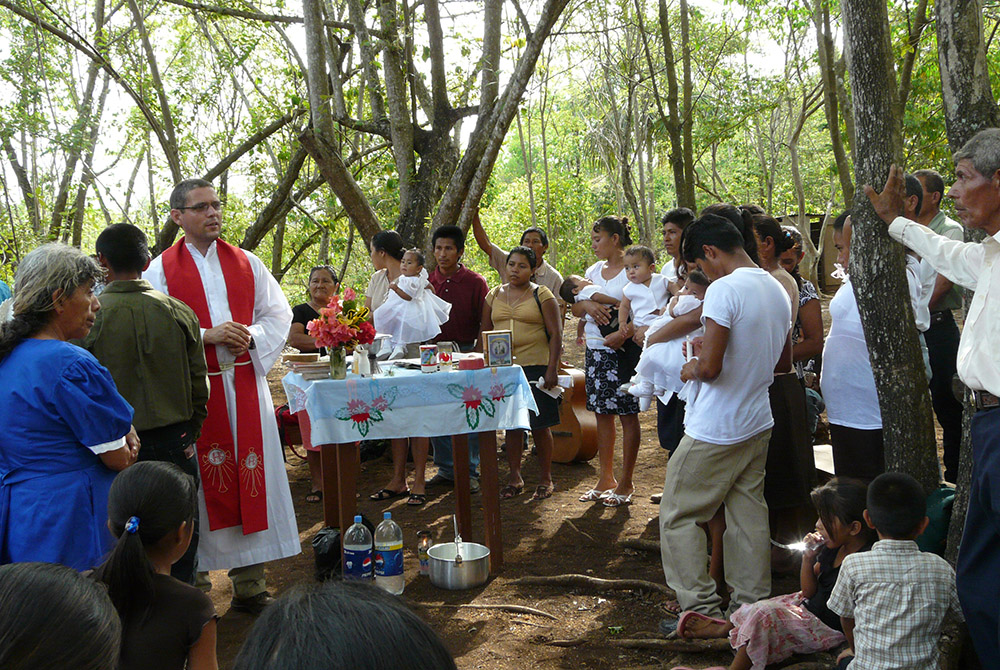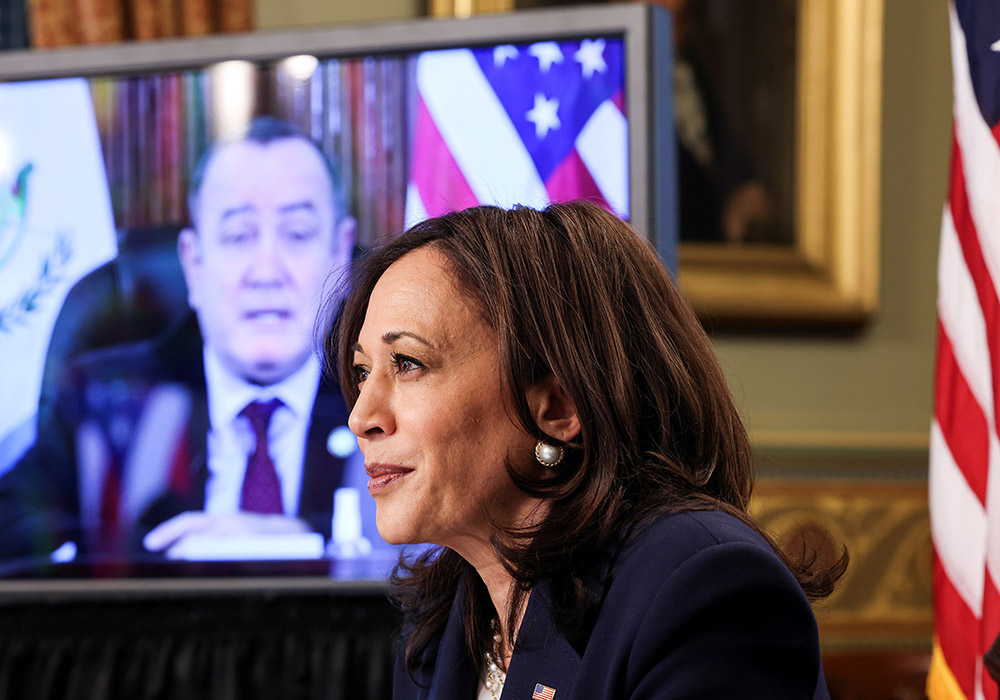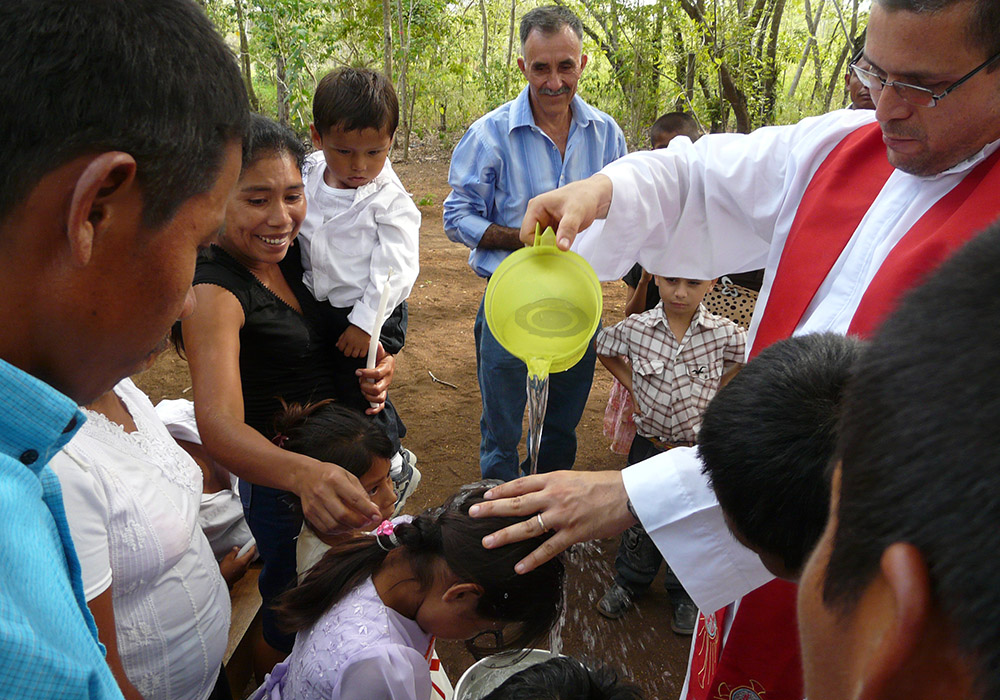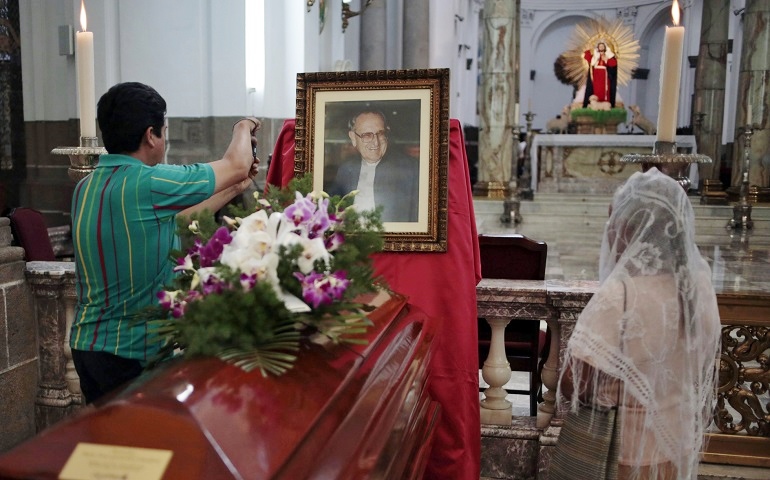
Vincentian Fr. Flavio Tercero leads a Mass and baptism for a community near El Naranjo, at the border between Guatemala and Mexico. Tercero repeated to NCR what so many involved with Guatemalan communities insist is key to addressing root causes of migration: dealing with corruption and impunity. (Courtesy of Flavio Tercero)
For the Biden administration, taking a new direction on immigration — as is the case with turning away from most Trump initiatives — is fairly easy at the start. A basic humanity and empathy, concern for the common good and even a smidgen of knowledge about history does the trick. It's in the long haul, in the politics and policies necessary to sustain the change, that the difficulty lies.
Nothing will demonstrate that more than the administration's stated intent to address the "root causes" of the crisis at the border, which itself is misnamed. It is first and foremost a crisis of culture mostly in what has become known as "the Northern Triangle" of that isthmus — Guatemala, Honduras and El Salvador.
The root causes of the current and ongoing problems in those countries are deep, extending back from the modern era several decades to vicious dictators, exploitative oligarchies, and foreign intervention — primarily from the United States — enabling and propping up the injustices. In 1954, a CIA-managed military coup overthrew the democratically elected President Jacobo Árbenz in order to protect the monopolistic practices of the United Fruit Company. What followed was the birth of the guerrilla movement in Central America, which led to a 36-year civil war.
In those decades, as well documented, the United States backed some of the bloodiest dictators in the hemisphere. Hundreds of thousands died at the hands of government-affiliated death squads in the cities and of U.S.-trained military that laid siege on Indigenous villages in rural parts of the country.
How comprehensively the administration, led in this effort by Vice President Kamala Harris, will be able to address root causes is yet unknown. Her whirlwind swing through Guatemala and Mexico is a welcome symbol of that intent. But it is burdened with the baggage of U.S. politics and the need to placate those who insist that the problem begins and ends at the border with Mexico. Contrary to some beliefs, those trying to get into the U.S. are not simply brown-skinned opportunists, they are desperate people fleeing relentless violence and horrific living conditions.

Vice President Kamala Harris speaks from the White House in Washington April 26, via videoconference with Guatemala's President Alejandro Giammattei about solutions to an increase in migration. (CNS/Evelyn Hockstein, Reuters)
Vincentian Fr. Flavio Tercero, who was pastor of a parish in Guatemala's Peten region for nearly nine years, and Ramón Cadena, a Guatemalan lawyer and former director of the International Commission of Jurists for Central America, have long accompanied and advocated for many of the groups at the margins of Guatemalan society. Those groups, dispossessed of land and subject to incessant violence, come to the conclusion that their only alternative is to leave the certainty of an endlessly bleak and difficult life for them and their families, and take on the uncertainty of the dangerous trek north in hope of a better future.
In a statement written by both men and shared by email and titled, "My future is a better place to live," they expressed hope that the Biden administration's effort will be different from former attempts to address the "border problem."
"Each department in Guatemala producing migrants has its own reality," they write. "Whether there is violence or social conflicts due to land disputes, or because of the implementation of the so called 'mega projects' (hydro-electric plants, mining, tourism infrastructure, etc.), or because of the existence of organized crime or narcotrafficking, the result is the same. Young persons, women and children flee from their communities, in order to find a better future elsewhere."
Tercero, assistant coordinator of the Vincentian Family Office in Philadelphia since 2015, repeated in a recent interview with NCR what so many involved with communities in Guatemala insist is key to addressing root causes: dealing with corruption and impunity.
In a recent phone interview with NCR from Guatemala City, Cadena said the basis for future progress are contained in the Peace Accords of the early 1990s. They aren't perfect, he said, but they are an important tool for establishing a more just society.
In one area with which he is particularly familiar, people forcibly removed by the government from their land in order to accommodate large development projects, he said the Peace Accords provided a way forward. The proposals provided for dealing with land disputes through tribunals, a way to deal with such disagreements "not through eviction, but through justice."
He said he worked on establishing such tribunals, but they were abandoned because of opposition from the private sector. Both Cadena and Tercero are wary of Harris' announcement that the administration is looking to invest up to $4 billion in the region with $48 million going to Guatemala for entrepreneurial purposes, affordable housing and agriculture businesses.
If the money comes into the region without diligent oversight, they said, the inevitable result will be more corruption.

Vincentian Fr. Flavio Tercero leads a Mass and baptism for a community near El Naranjo, at the border between Guatemala and Mexico. (Courtesy of Flavio Tercero)
It is also difficult to imagine how the United States can demand accountability from Guatemalan President Alejandro Giammattei, who dismantled a highly effective, UN-backed International Commission Against Impunity in Guatemala, or CICIG, its Spanish acronym. Guatemala justice officials and activists worked with CICIG and the U.S. government "to dismantle the criminal networks that have long operated with impunity," according to a February report in The New York Times. "Their efforts led to the resignation and arrest of former President Otto Perez Molina in 2015, and to formal accusations against more than 1,500 people, including powerful politicians and members of the business community."
Hope in the long haul also may be immediately qualified by the fact that so much Republican leadership in the United States is stuck in a fantasy that threatens to undermine fundamental democratic processes. Odds are slim that the same leaders would be willing to confront our demons of the past when both parties were complicit with bloody dictators and their militaries, directly undermining democratic processes elsewhere.
One might gain hope, though, from Harris' claims that her effort is widely consultative of a range of stakeholders, including community groups and nongovernmental actors, and not just government officials and leaders of the private sector. Again, some efforts may be fairly simple, like restoring funding to programs slashed when Trump cut aid going to groups such as the Association for a More Just Society, which has worked in the past with the Honduran justice system to successfully prosecute violent criminals, dealing with one of the principal reasons people flee.
[Kamala Harris] should make special efforts to see that her team working on the problem consults religious communities in Guatemala. They have a significant stake in previous attempts to bring renewal and justice to a fractured society.
She should make special efforts to see that her team working on the problem consults religious communities in Guatemala. They have a significant stake in previous attempts to bring renewal and justice to a fractured society. The country has been torn along economic lines, with deep gaps between rich and poor. Historically, divisions along racial lines have resulted during recent decades in what the U.N. and a Guatemalan court termed a "genocide" against Guatemala's Indigenous population.
Catholics have an important place in those efforts. Bishop Juan Gerardi, an auxiliary bishop in Guatemala City, led the Recovery of Historical Memory Project, begun by Guatemala's Catholic bishops in 1995. The Recovery of Historical Memory Project report was published in 1998. Gerardi was murdered two days after its release. And modern North American martyr Fr. Stanley Rother of Oklahoma City, was beatified for his life of work with Indigenous in a particularly dangerous part of Guatemala. Despite death threats, he remained with his parish there and was murdered by a government death squad in 1981 and beatified in 2017.

People stand around the casket of Auxiliary Bishop Juan Gerardi at the cathedral in Guatemala City April 25, 2013, in observance of the 15th anniversary of his murder. (CNS/Jorge Dan Lopez, Reuters)
Guatemala is key because of its location and, in relative terms, its willingness to work with the United States. If it is awash today in corruption and an unhealthy alliance involving government, military and private sector, not long ago it showed a remarkable ability to develop robust courts and a highly capable justice system.
"Guatemala is the link between Central America and Mexico," Paul Angelo, a fellow for Latin America Studies at the Council on Foreign Relations, told USA Today. "It's geographically situated in such a way that it provides a geostrategic advantage for slowing migration." If it is a vital link to the North from other parts of Central America, it is also a major contributor to that exodus because of conditions within its own borders.
Neither the vice president nor anyone else seriously considering what it will take to stem the desperate flight to the North will stake much on a two-day swing through a portion of the region. Progress will take persistence and understanding enough of how U.S. actions in the past contributed to the crisis of today that we won't repeat failed policies. Turning away from Trump's impetuous non-policies is the easy part. If there is hope that the turn away goes deeper than talk, it lies in the competence of experts who have replaced the charlatans that drove the previous administration.
Advertisement
In an email following Harris' visit to Guatemala, Cadena said he was encouraged by the vice president's emphasis on the need for Guatemala and other countries to care for their people in order to stem emigration, her strong words about rooting out corruption, and the creation of a joint task force to combat human smuggling and trafficking networks.
At the same time, he was disappointed at the limited contact she had with grassroots groups and representatives. In his estimation, the human rights groups she met were those more closely aligned with government and big business. He said the populations in the Peten region that has an extensive border with Mexico, those who have been evicted from their lands and left to fend for themselves, were not represented.
Perhaps the scope of the issues and contacts were simply limited by time. The vice president's trip was the political face of an effort that is devilishly difficult and complex. Telling desperate people to stay put, as Harris did, is theater for the home crowd. One might as well tell a drowning person to ignore a life vest. Change has to occur in Central America before calm is restored at the border.








